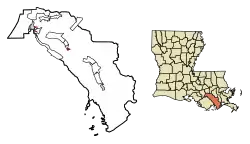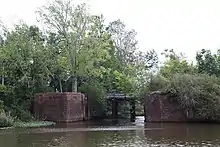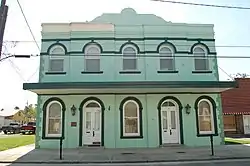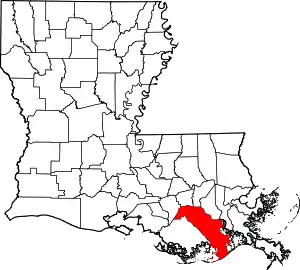Lockport, Louisiana
Lockport is a town on Bayou Lafourche in Lafourche Parish, Louisiana, United States. The population was 2,490 in 2020. It is part of the Houma–Bayou Cane–Thibodaux metropolitan statistical area.
Town of Lockport | |
|---|---|
Town | |
 Location of Lockport in Lafourche Parish, Louisiana. | |
.svg.png.webp) Location of Louisiana in the United States | |
| Coordinates: 29°38′33″N 90°32′24″W | |
| Country | |
| State | |
| Parish | Lafourche |
| Government | |
| • Mayor | Barry Plaisance (R) (elected 2022)[1] |
| • Town Council | Members list |
| Area | |
| • Total | 1.15 sq mi (2.98 km2) |
| • Land | 1.13 sq mi (2.93 km2) |
| • Water | 0.02 sq mi (0.05 km2) |
| Elevation | 10 ft (3 m) |
| Population (2020) | |
| • Total | 2,490 |
| • Density | 2,197.71/sq mi (848.72/km2) |
| Time zone | UTC-6 (CST) |
| • Summer (DST) | UTC-5 (CDT) |
| ZIP Code | 70374 |
| Area code | 985 |
| FIPS code | 22-44900 |
| Website | http://www.townoflockport.com |
History

Lockport, founded in 1835, traces its history to Jacques Lamotte, who in 1790 owned a large tract of land along Bayou Lafourche. Lemotte sold a portion of the tract to Messrs. Mercier and Marcantel in 1814. In 1823 William Field purchased a parcel of the land and later donated 5 arpents of it on both banks of Bayou Lafourche to Barataria and Lafourche Canal Company. As part of the transaction, the company agreed to build a canal, which would link Bayou Terrebonne to New Orleans. Allou D'Hemecourt surveyed the area in 1835. His map bears the name Longueville. Eventually, the village's name would become Lockport.
At first the canal, completed in 1847, brought prosperity to the area. Three years later locks were completed at the point where the canal reached Bayou Lafourche. Shipping along the canal was brisk until 1868. After that time, part of the waterway was no longer in use. The crevasse of 1876 partially destroyed the locks. Today remnants of the brick bulwark are still visible under a blanket of weeds.
Lockport prospered in spite of the canal's failure as a business venture. In 1849 the first public school opened. It was a one-room affair in Scanian's Cooperage. In 1850 Holy Savior Catholic Church was dedicated, and in 1879 an order of nuns established Holy Savior School.
The Village of Lockport was incorporated in 1899, and a mayor and board of aldermen were named. At the turn of the century, the village boasted a post office, brick sidewalks, an iron bridge over the bayou, a newspaper, ice house, banks, hotels, liveries, blacksmith shop, clothing stores, grocery and general merchandise stores, and various other enterprises. The iron bridge created quite a stir among the populace. It joined Lockport to Rita, the settlement on the east bank of the bayou.
One of the worst calamities to touch the village occurred in 1916, when a disastrous fire destroyed a large part of the business area and several homes. As a result of this tragedy, a water tower was erected on Main Street near the present day Sheriff's Annex, where it stood until Hurricane Betsy destroyed it in 1965. By 1948 Lockport's population had grown to the point where its status was changed from village to town. Its boundaries had been expanded, and later the site of the canal bridge was changed to fifth street, now Crescent Avenue. Highway 1 no longer ran along Main Street. Several businesses sprang up along the new route, and that area has become the business hub of the town. Today Lockport is a progressive community, dependent upon a diversified economy, surrounded by industries such as shipbuilding, sugarcane farming, oil and gas exploration, cattle, fishing, and a variety of vegetable farms. Through the years Lockport has managed to retain its small town quality - a quality that welcomes visitors who travel along Bayou Lafourche, the longest street in the world [3]
Geography
According to the United States Census Bureau, the town has a total area of 0.6 square miles (1.6 km2), of which 0.6 square miles (1.6 km2) is land and 0.04 square miles (0.10 km2) (3.12%) is water.
Demographics
| Census | Pop. | Note | %± |
|---|---|---|---|
| 1880 | 171 | — | |
| 1900 | 401 | — | |
| 1910 | 669 | 66.8% | |
| 1920 | 803 | 20.0% | |
| 1930 | 866 | 7.8% | |
| 1940 | 877 | 1.3% | |
| 1950 | 1,388 | 58.3% | |
| 1960 | 2,221 | 60.0% | |
| 1970 | 2,398 | 8.0% | |
| 1980 | 2,424 | 1.1% | |
| 1990 | 2,503 | 3.3% | |
| 2000 | 2,624 | 4.8% | |
| 2010 | 2,578 | −1.8% | |
| 2020 | 2,490 | −3.4% | |
| U.S. Decennial Census[4] | |||
| Race | Number | Percentage |
|---|---|---|
| White (non-Hispanic) | 2,104 | 84.5% |
| Black or African American (non-Hispanic) | 106 | 4.26% |
| Native American | 23 | 0.92% |
| Asian | 5 | 0.2% |
| Other/Mixed | 127 | 5.1% |
| Hispanic or Latino | 125 | 5.02% |
As of the 2020 United States census, there were 2,490 people, 983 households, and 598 families residing in the town.
Government and infrastructure

The United States Postal Service operates the Lockport Post Office.[6]
The town government operates in the Lockport Civic Complex (Town Hall) on Church Street.
Education
Lafourche Parish Public Schools operates public schools, including:
- Lockport Lower Elementary School (K-2)[7]
- Lockport Upper Elementary School (3-5)[8]
- Lockport Middle School[9]
Lockport is served by Central Lafourche High School in Mathews,[10][11] formed by a 1966 merger of Lockport High School and Raceland High School.[12]
Holy Savior Catholic School opened in 1879, established by an order of nuns.[13]
A one-room schoolhouse established in 1849 at Scanian’s Cooperage was the first school in Lockport.[13]
The 501(C)(3) Camille and Braxton Hebert Memorial Fund Inc. was used to establish recreational areas/playgrounds at both elementary schools. The fund was named after the brother and sister Camille and Braxton Hebert,[14] who were murdered by their mother, Amy Hebert, on August 20, 2007. The playground at Lockport Lower has the text "Braxton's Buddies".[15] Camille's Court, at Lockport Upper, was scheduled to be a basketball court decorated with a plaque and flowerbed.[16]
Lafourche Parish Library operates the Lockport Branch.[17]
Notable people
- Jefferson J. DeBlanc, pilot who received the Medal of Honor for his actions in World War II[18]
- Dick Guidry, former state representative from Lafourche Parish and former owner of drive-in theaters
References
- "Town of Lockport Officials & Staff".
- "2020 U.S. Gazetteer Files". United States Census Bureau. Retrieved March 20, 2022.
- Town of Lockport Official Website
- "Census of Population and Housing". Census.gov. Retrieved June 4, 2015.
- "Explore Census Data". data.census.gov. Retrieved December 28, 2021.
- "LOCKPORT." United States Postal Service. Retrieved on March 11, 2017. "706 CRESCENT AVE LOCKPORT, LA 70374-9998"
- Home. Lockport Lower Elementary School. Retrieved on November 27, 2016. "1421 Crescent Avenue Lockport, LA 70374"
- Home. Lockport Upper Elementary School. Retrieved on November 27, 2016. "201 School Street Lockport, LA 70374"
- Home. Lockport Middle School. Retrieved on November 27, 2016. "720 Main Street Lockport, LA 70374"
- "2010 CENSUS - CENSUS BLOCK MAP: Lockport town, LA." U.S. Census Bureau. Retrieved on November 29, 2016.
- "SCHOOL ATTENDANCE BOUNDARIES Archived 2016-12-02 at the Wayback Machine." Lafourche Parish Public Schools. Retrieved on December 2, 2016. Based on the text description of the school boundaries
- Theriot, Clifton. Lafourche Parish. Arcadia Publishing, December 1, 2014. ISBN 1439648662, 9781439648667. p. 71.
- "History." Town of Lockport. Retrieved on November 29, 2016.
- Home. Camille and Braxton Hebert Memorial Fund Inc. October 10, 2008. Retrieved on November 27, 2016.
- Ruffin, Sophia (June 24, 2009). "Mom sentenced to 2 life terms". Houma Times. Retrieved November 27, 2016.
- Thurston, Dee Dee (September 12, 2007). "Memorials to be built for slain children". Houma Today. Retrieved November 28, 2016.
- "Branch Locations and Contact." Lafourche Parish Library. Retrieved on November 28, 2018.
- "DeBlanc, Jefferson Joseph". Congressional Medal of Honor Society. Retrieved February 20, 2014.
